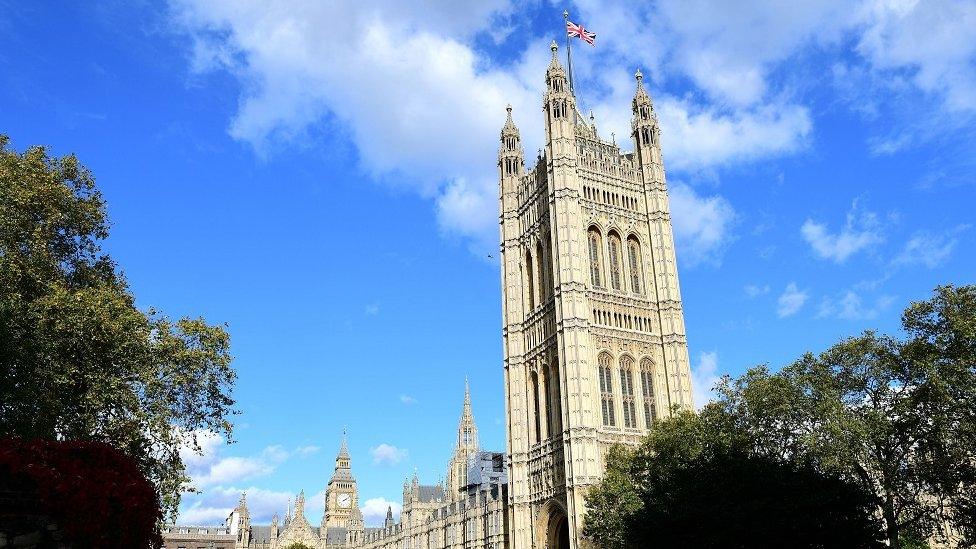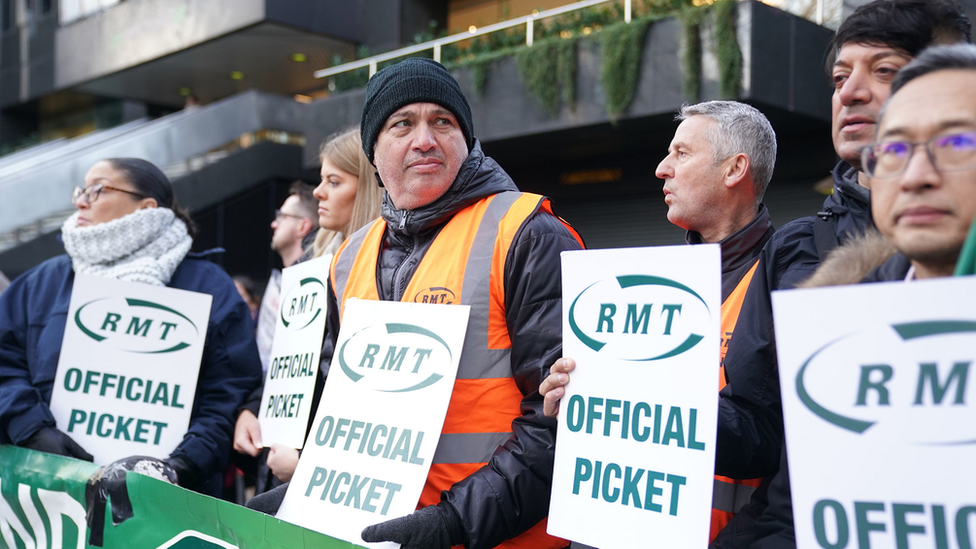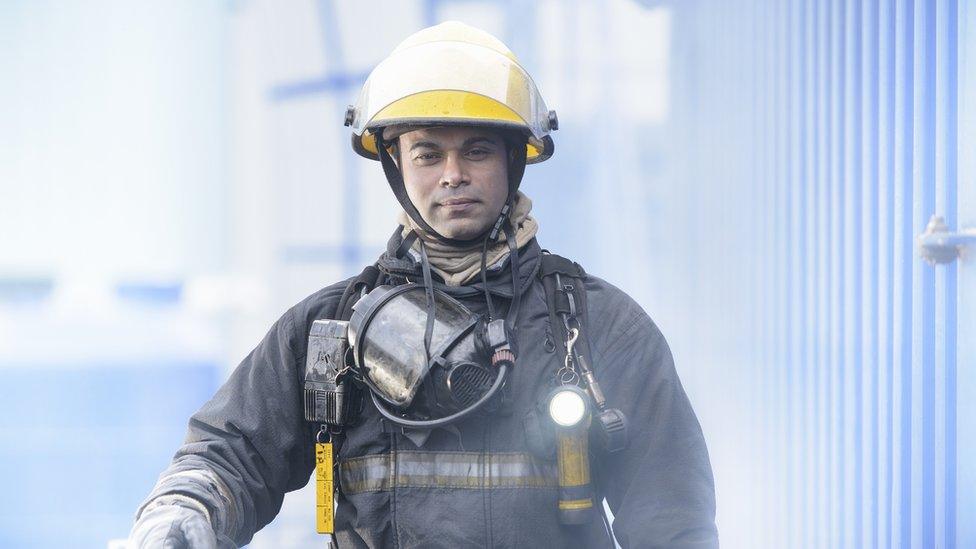What's happening in Parliament this week?
- Published

Some serious controversy hits Planet Westminster next week.
The government has changed the Commons programme to hold the initial debate on the Strikes (Minimum Service Levels) Bill on Monday. This aims to set minimum levels of service which must be met during strikes. It could mean some public sector workers would be required to work during a strike or face being fired.
Unions have criticised the measure as "undemocratic, unworkable and illegal".
The government is aiming to whiz the bill through the Commons. This means the whole House will consider the detail, rather than by the usual public bill committee, with debate on the detail limited to five hours. And given the government majority in the Commons, the bill will soon be on its way to the Lords.
And the Lords is where the parliamentary problems may start. The last time the government legislated on trade unions was 2016. Back then Labour dug their heels in. And peers voted to set up a select committee to look at the issues, and later inflicted three substantial defeats on the detail of the Trade Union Bill.
Remember, the Lords almost never seek to simply kill a bill. Their power is to delay and to rewrite key points, which MPs the have to reconsider.
They can force the government to revisit difficult issues a number of times - remember the political stink around the sewage discharge amendment to the Environment Bill? These days, the balance of power in the Lords is rather tighter, and much will depend on whether Crossbench, or independent peers are prepared weigh in.

An RMT picket line outside Euston Station in London during a rail strike in January
Another flashpoint could come if UK ministers seek to block the Scottish Parliament's Gender Recognition Reform Bill.
The bill ends the need for a medical diagnosis for a gender recognition certificate in Scotland. It reduces the time needed for someone to live in their acquired gender from two years to a matter of months before applying for a recognition certificate. It also lowers the eligibility age from 18 to 16.
The key issue here will be whether the bill has ramifications for UK law. The prime minister has said the government is taking legal advice. The deadline for ministers to intervene runs out next week.
They refer it to the Supreme Court for a ruling about whether it encroaches on UK law under Section 33 of the Scotland Act, or if the Westminster government can bring in an order to veto it under Section 35.
Expect a government statement or an urgent question. Then a gigantic row, if either option is taken. The SNP Westminster group attempting to block the move, although they're not without their own divisions.
Monday 16 January
Commons: From 14:30 GMT it is Education Questions - and any post-weekend urgent questions or government statements.
The main debate is on the Strikes Minimum Service Levels Bill.
Westminster Hall: At 16:30 MPs debate an e-petition titled "Ban commercial breeding for laboratories. Implement reform to approve and use Non-Animal Methods".
Committees: At 15:00 the Treasury Committee questions Bank of England Governor, Andrew Bailey, on the Bank's latest Financial Stability Report. Likely topics include the Government's reforms to financial services, the rising cost of living, and the UK's international credibility for investors.
Lords: The main debate a 14:30 will be committee stage consideration of the National Security Bill.
Tuesday 17 January
Commons: At 11:30 Business, Energy and Industrial Strategy Questions starts the day. Then a Ten Minute Rule Bill by Conservative Simon Baynes on providing better support for markets and market traders.
There's also a bill from Conservative Paul Maynard, who represents Blackpool North, calling for the House of Lords to be relocated to "a large ballroom in Blackpool." It will be presented but won't be debated.
The main debate sees MPs then revisit the detail of the Online Safety Bill. MPs send the bill back to Committee for revisions which took account of backbench Conservative concerns that its proposals to deal with so-called "legal but harmful" content could damage free speech.
The removed sections were the brainchild of former culture secretary Nadine Dorries. As mental health minister she frequently spoke about her concerns around the mental health impact of online content - will she speak?

The online safety bill continues to generate controversy
Several interesting amendments loom. Conservative MPs Sir Bill Cash and Miriam Cates are pushing to make senior management of online companies personally criminally liable for pushing harmful content to children. They could face two years in prison. Enough Conservative MPs had signed the amendment to worry ministers - so concessions may be offered.
Watch out too for an amendment from the SNP's Kirsty Blackman. She wants social media providers to give young users the ability to filter out problematic content. The latest addition is a cross-party amendment signed by several senior MPs to designate content promoting LGBT+ conversion therapy as harmful.
Committees: At 10:00 the Education Committee holds a one-off session on the findings of the Independent Inquiry into Child Sexual Abusem with chair Alexis Jay.
Lords: From 14:30 peers have their initial debate on the government's flagship Levelling-up and Regeneration Bill. The bill intendeds to tackle regional inequalities. Expect Labour to say it fails to deliver on the government's promises. Watch out for signals of the kind of amendments which could be proposed later.
Wednesday 18 January
Commons: The day begins at 11:30 with Wales Questions, followed at noon by Prime Minister's Questions.
The there's a Ten Minute Rule Bill by Labour's Alex Davies-Jones wants more information published about in-vitro fertilisation.
The main debate is on the Remaining stages of the Retained EU Law (Revocation and Reform) Bill. This is the measure which aims to remove or rewrite laws inherited from the EU, by the end of this year - an ambition dismissed as impossible by critics, because of the sheer tonnage of law to be processed.
Westminster Hall: At 14:30 former minister Sir Bob Neill leads a debate on funding decisions by the Arts Council - expect cuts to the English National Opera to feature.
Committees: At 09:30 the Transport Committee quizzes former Chair of the Committee, Huw Merriman, now Rail Minister, on the rail strikes. His first appearance since joining the government.
The Northern Ireland Affairs Committee has a journey to Belfast to examine the effect of paramilitary activity and organised crime on women.
Lords: From 15:00 Peers have their fifth and final Committee day on the detail of the National Security Bill
And there's a regret motion against an increase to penalty fares on the railways. Labour's Lord Snape says it can't be justified while services are poor.
Thursday 19 January
Commons: At 09:30 the day starts with Transport Questions and the weekly statement on the following week's Commons Agenda, from the Leader of the House.
Then there are two Backbench debates: first, on the imprisonment of Jagtar Singh Johal, a British national from Dumbarton, who has been unlawfully detained in India since 2017.
Then there's a debate on Russian Grand Strategy led by senior Conservative Sir Bernard Jenkin. Sir Bernard who will argue that the West needs a coherent long-term strategy to counter Russia.
Lords: At 11:30 there is a debate on International Holocaust Memorial Day, on plans to celebrate the 75th anniversary of the arrival of the Windrush and the contribution made by Caribbean people to Britain
This is followed be a debate on the relationship between the UK and India.
Friday 20 January
Commons: From 09:30 MPs process a whole series of private members bills new laws proposed by individual MPs. These bills have emerged from detailed scrutiny in committee.
There are several on employment issues, which are backed by the government - a sort of self-assembly employment bill. Stuart C McDonald's Neonatal (Leave and Pay) Bill and Virginia Crosbie's Employment (Allocation of Tips) Bill are the two components up for debate today.
Then comes Mary Robinson's Pensions Dashboards Bill, and Christina Rees' Shark Fins Bill.
One of the striking points about this is the positive use of private members bills push through changes which didn't make it into the main legislative programme - with long-serving whip Rebecca Harris getting a lot of credit for ring-mastering the process.
There's a long list of further bills, but the chances are that there won't be time for any substantive discussion on any of them.
Lords: From 10:00 there are debates on Select Committee reports - on the Northern Ireland Protocol; Building a Stronger Union for the 21st century and The net zero transformation.
- Published13 January 2023

- Published31 January 2023

